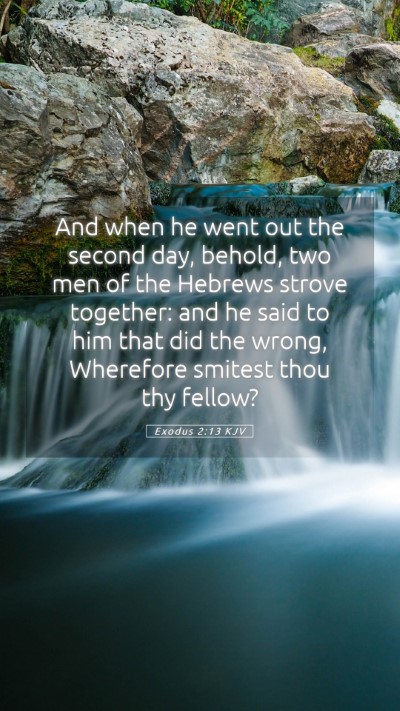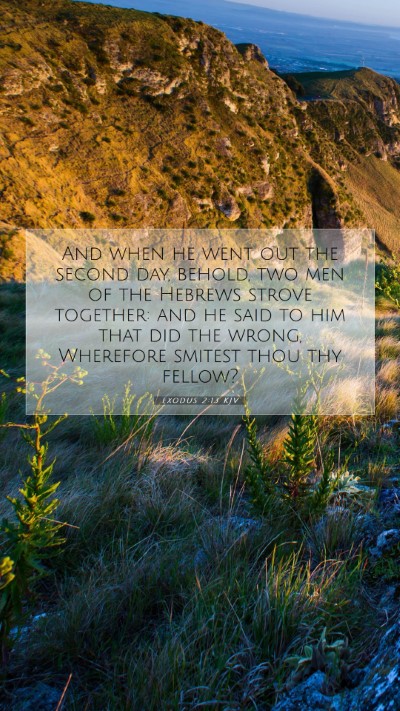Exodus 2:13 - Bible Verse Meaning and Interpretation
Verse: "And when he went out the second day, behold, two men of the Hebrews strove together: and he said to him that did the wrong, Wherefore smitest thou thy fellow?" (Exodus 2:13, KJV)
Overview: This verse occurs during the early life of Moses, where we see him intervening in a conflict between two Hebrews. His action here provides significant insight into his character and foreshadows his future role as a deliverer of his people.
Commentary Insights
-
Matthew Henry: Henry emphasizes the moral responsibility that Moses feels toward his fellow Hebrews. He interprets Moses' inquiry as a reflection of his innate sense of justice and compassion. This moment is crucial in showcasing Moses' identity as a protector, which denotes his future role in leading the Israelites out of bondage.
-
Albert Barnes: Barnes points out that this passage highlights the tendency of humanity to conflict and violence, even among brethren. He emphasizes Moses' question as not only a challenge but also an invitation for reflection among the disputants, encouraging personal accountability in addressing disputes. Barnes also notes the importance of unity among the people of God, which is often disrupted by strife.
-
Adam Clarke: Clarke discusses the significance of Moses' actions, arguing that they reflect his internal struggle with his identity as a Hebrew raised in Pharaoh's household. Moses' confrontation shows his desire to partake in the struggles of his people, suggesting a prelude to the leadership he will assume. Clarke also emphasizes the moral implications of justice and peacemaking highlighted in this verse.
Historical Context
This verse occurs following Moses' flight from Egypt after killing an Egyptian who was beating a Hebrew. The passage, therefore, captures a crucial moment in Moses’ transition from royalty to his role as a leader of the enslaved Israelites. Understanding the sociopolitical context of slavery in Egypt helps elucidate the weight of Moses' actions.
Bible Verse Understanding
In Exodus 2:13, Moses stands at a crossroads that many face: the challenge of standing for justice. This scripture provides deep Bible verse commentary on how one might act righteously in the face of conflict. Moses embodies the struggle against oppression and the moral imperative to address wrongful actions.
Application of the Verse
The implications of this passage are profound, extending beyond its historical context and into modern-day applications. In terms of Bible study insights, readers are encouraged to reflect on their own roles in situations of conflict. Questions posed by this verse, such as “Wherefore smitest thou thy fellow?” challenge individuals to assess their responses to discord.
Cross References
- Exodus 2:11-12 - The backstory of Moses killing the Egyptian and the initial act of justice.
- Exodus 2:14 - The response of the Hebrews to Moses' intervention, highlighting the division among the people.
- Acts 7:24-25 - Stephen's account of Moses, underscoring his destiny and intentions toward his people.
Conclusion
The study of Exodus 2:13 opens a door to understanding complex themes of leadership, justice, and conflict resolution. Through a careful examination of this verse from various public domain commentaries, an enriched perspective on biblical teachings is attained, making it a valuable addition to Bible study resources.


